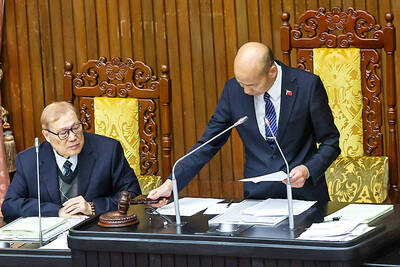China's wealthiest person prospered by turning recycled paper from the US into Chinese packaging products -- and like many fellow tycoons, by listing her company on an overseas stock market.
Zhang Yin (
Zhang's company listed shares on the Hong Kong Stock Exchange in March, becoming one of scores of mainland-based companies enriched by international investors' fervor for Chinese assets. The company recently saw its share price surge after reporting that its fiscal 2006 net profit more than quadrupled to 1.375 billion yuan (US$174 million).
Lists of China's richest people tend to reflect shifting economic trends.
Dot-com magnates of years past have yielded rank to real estate tycoons and electronics retailers, who in turn are ceding ground to newcomers like Zhang and fifth-ranked Shi Zhengrong (
No. 2 is Huang Guangyu (黃光裕), also known as Wong Kwong Yu, who founded GoMe Appliances (國美電器), China's biggest electronics retailer. Huang, who was ranked first last year, now has personal wealth estimated at US$2.5 billion, according to the list.
Along with his brother, property developer Huang Junqing's US$800 million fortune, the Huangs hold wealth estimated at US$3.3 billion.
"Urbanization and ever-increasing household incomes have continued to be the key drivers for wealth creation in China," said Hoogewerf, who has been compiling lists of China's wealthy since 1999.
Paper tycoon Zhang, the eldest of eight children born to a military family in northeastern China, emigrated to Hong Kong as a young adult and built up her business shipping waste paper from the US to China, where it is recycled into containerboard at factories in southern and eastern China.
As is true elsewhere, real estate is key to many personal fortunes: seven of the top 10 richest Chinese are at least in part property developers. Likewise, seven of the top 10 have companies with shares traded in Hong Kong.
Among the other top women tycoons is Chen Ningning (
The ranks of China's wealthiest have expanded, with 15 people having fortunes exceeding US$1 billion, up from seven last year, Hoogewerf said.
The average size of the wealth held by each individual also rose, by 48 percent over a year earlier to US$276 million.
The growing divide between rich and poor is a politically volatile issue in China, despite the Communist Party's wholesale shift away from central planning toward a more capitalist-style economy.
Helping the vast majority of have-nots was to top the agenda at closed-door meetings held in Beijing this week.
Though most of China's newly affluent are little affected by such high-level politicking, fortunes are sometimes made and lost quickly amid power plays by top leaders, Hoogewerf said.
One of the tycoons absent from this year's list was Zhang Rongkun (
Zhang, owner of Fuxi Investments, ranked 48th on last year's list.

DEFENDING DEMOCRACY: Taiwan shares the same values as those that fought in WWII, and nations must unite to halt the expansion of a new authoritarian bloc, Lai said The government yesterday held a commemoration ceremony for Victory in Europe (V-E) Day, joining the rest of the world for the first time to mark the anniversary of the end of World War II in Europe. Taiwan honoring V-E Day signifies “our growing connections with the international community,” President William Lai (賴清德) said at a reception in Taipei on the 80th anniversary of V-E Day. One of the major lessons of World War II is that “authoritarianism and aggression lead only to slaughter, tragedy and greater inequality,” Lai said. Even more importantly, the war also taught people that “those who cherish peace cannot

STEADFAST FRIEND: The bills encourage increased Taiwan-US engagement and address China’s distortion of UN Resolution 2758 to isolate Taiwan internationally The Presidential Office yesterday thanked the US House of Representatives for unanimously passing two Taiwan-related bills highlighting its solid support for Taiwan’s democracy and global participation, and for deepening bilateral relations. One of the bills, the Taiwan Assurance Implementation Act, requires the US Department of State to periodically review its guidelines for engagement with Taiwan, and report to the US Congress on the guidelines and plans to lift self-imposed limitations on US-Taiwan engagement. The other bill is the Taiwan International Solidarity Act, which clarifies that UN Resolution 2758 does not address the issue of the representation of Taiwan or its people in

The Philippines yesterday criticized a “high-risk” maneuver by a Chinese vessel near the disputed Scarborough Shoal (Huangyan Island, 黃岩島) in a rare incident involving warships from the two navies. The Scarborough Shoal — a triangular chain of reefs and rocks in the contested South China Sea — has been a flash point between the countries since China seized it from the Philippines in 2012. Taiwan also claims the shoal. Monday’s encounter took place approximately 11.8 nautical miles (22km) southeast” of the Scarborough Shoal, the Philippine military said, during ongoing US-Philippine military exercises that Beijing has criticized as destabilizing. “The Chinese frigate BN 554 was

LEISURE: The new law adds Confucius’ birthday, the anniversary of the Battle of Guningtou, Constitution Day and Little New Year as national holidays The Legislative Yuan yesterday passed new legislation adding four national holidays and making Workers’ Day a national holiday for all sectors. The Chinese Nationalist Party (KMT) and the Taiwan People’s Party used their combined majority in the legislature to push the jointly proposed draft through its third and final reading. This new law supersedes the existing regulations for the implementation of memorial days and state holidays, which are administered by the Ministry of the Interior. The new law recognizes Confucius’ birthday on Sept. 28, the anniversary of the Battle of Guningtou on Oct. 25, Constitution Day on Dec. 25 and “Little New Year,”